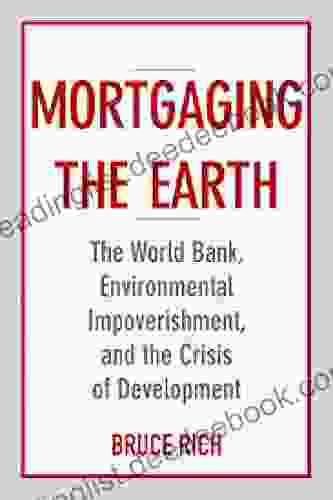The World Bank: Environmental Impoverishment and the Crisis of Development

The World Bank, a global financial institution, has played a significant role in shaping development policies and practices around the world. However, the Bank has also been subject to criticism for its environmental policies and their impact on developing countries. Critics argue that the Bank's policies have contributed to environmental degradation, displacement, and poverty, undermining the very development goals they are intended to support.
This article provides a comprehensive analysis of the World Bank's environmental record, exploring the evidence and arguments for and against the Bank's policies. The article concludes by discussing the need for alternative approaches to development that prioritize environmental sustainability and social justice.
The World Bank's environmental record is a mixed bag. The Bank has supported some projects that have had positive environmental outcomes, such as investments in renewable energy and protected areas. However, the Bank has also been involved in projects that have had negative environmental impacts, such as the construction of dams and roads in sensitive ecosystems.
4.7 out of 5
| Language | : | English |
| File size | : | 32757 KB |
| Text-to-Speech | : | Enabled |
| Enhanced typesetting | : | Enabled |
| Print length | : | 393 pages |
| Lending | : | Enabled |
| Screen Reader | : | Supported |
One of the most common criticisms of the World Bank is that its policies have contributed to environmental degradation. For example, the Bank's support for large-scale dam projects has been linked to deforestation, water pollution, and the displacement of indigenous peoples. Similarly, the Bank's support for industrial agriculture has been linked to the overuse of pesticides and fertilizers, which can damage soil and water quality.
Another criticism of the World Bank is that its policies have contributed to displacement and poverty. For example, the Bank's support for urban renewal projects has often resulted in the eviction of poor communities. Similarly, the Bank's support for export-oriented agriculture has often led to the displacement of small-scale farmers.
There are a number of arguments in favor of the World Bank's environmental policies. Some argue that the Bank's investments in developing countries have helped to improve environmental conditions. For example, the Bank's support for renewable energy has helped to reduce greenhouse gas emissions. Similarly, the Bank's support for protected areas has helped to conserve biodiversity.
Others argue that the World Bank's environmental policies are necessary to promote economic development. They argue that developing countries need to exploit their natural resources in order to generate revenue and improve their living standards. They also argue that environmental regulations can be a barrier to economic growth.
However, there are also a number of arguments against the World Bank's environmental policies. Critics argue that the Bank's policies have contributed to environmental degradation, displacement, and poverty. They also argue that the Bank's policies are often driven by profit motives rather than a genuine concern for the environment or the well-being of developing countries.
The World Bank's environmental record highlights the need for alternative approaches to development that prioritize environmental sustainability and social justice. These approaches should focus on the following:
Investing in renewable energy and other sustainable technologies that can help to reduce greenhouse gas emissions and improve air and water quality.
Promoting sustainable agriculture practices that can protect soil and water quality, and reduce the use of pesticides and fertilizers.
Protecting ecosystems by establishing and managing protected areas, and by reducing deforestation and other forms of habitat destruction.
Investing in education and healthcare to improve the well-being of people in developing countries, and to provide them with the knowledge and skills they need to participate in sustainable development.
Promoting participatory development by involving local communities in the decision-making process, and by ensuring that they benefit from development projects.
The World Bank's environmental record is a complex and controversial issue. There is evidence to support both the arguments for and against the Bank's policies. However, it is clear that the Bank's policies have had a significant impact on the environment and the lives of people in developing countries.
The need for alternative approaches to development that prioritize environmental sustainability and social justice is more urgent than ever. These approaches must focus on investing in renewable energy, promoting sustainable agriculture, protecting ecosystems, investing in education and healthcare, and promoting participatory development. Only by adopting these approaches can we hope to achieve sustainable development that benefits both people and the planet.
- [1] The World Bank's Environmental and Social Framework (ESF)
- [2] The World Bank's Climate Change Strategy
- [3] The World Bank's Social Development Strategy
- [4] The World Bank's Poverty Reduction Strategy
- [5] The World Bank's Gender Equality Strategy
- [6] The World Bank's Indigenous Peoples Policy
- [7] The World Bank's Involuntary Resettlement Policy
- [8] The World Bank's Dams and Development Report
- [9] The World Bank's Forest Strategy
- [10] The World Bank's Mining and Extractive Industries Strategy
- [11] The World Bank's Oil, Gas, and Mining Policy
- [12] The World Bank's Power Sector Strategy
- [13] The World Bank's Transport Sector Strategy
- [14] The World Bank's Water Resources Strategy
- [15] The World Bank's Urban Development Strategy
- [16] The World Bank's Sustainable Development Goals (SDGs)
- [17] The World Bank's Environmental, Social, and Corporate Governance (ESG) Policy
- [18] The World Bank's Accountability Mechanism
- [19] The World Bank's Inspection Panel
- [20] The World Bank's Independent Evaluation Group (IEG)
4.7 out of 5
| Language | : | English |
| File size | : | 32757 KB |
| Text-to-Speech | : | Enabled |
| Enhanced typesetting | : | Enabled |
| Print length | : | 393 pages |
| Lending | : | Enabled |
| Screen Reader | : | Supported |
Do you want to contribute by writing guest posts on this blog?
Please contact us and send us a resume of previous articles that you have written.
 Page
Page Text
Text Genre
Genre Reader
Reader Library
Library Paperback
Paperback Magazine
Magazine Newspaper
Newspaper Paragraph
Paragraph Sentence
Sentence Shelf
Shelf Bibliography
Bibliography Synopsis
Synopsis Manuscript
Manuscript Library card
Library card Narrative
Narrative Biography
Biography Autobiography
Autobiography Memoir
Memoir Encyclopedia
Encyclopedia Dictionary
Dictionary Character
Character Resolution
Resolution Catalog
Catalog Card Catalog
Card Catalog Borrowing
Borrowing Periodicals
Periodicals Study
Study Research
Research Scholarly
Scholarly Lending
Lending Reserve
Reserve Academic
Academic Rare Books
Rare Books Special Collections
Special Collections Interlibrary
Interlibrary Thesis
Thesis Storytelling
Storytelling Awards
Awards Theory
Theory Paul G Young
Paul G Young Michael Vance
Michael Vance J C Ryle
J C Ryle Jennifer Thermes
Jennifer Thermes Caryl Churchill
Caryl Churchill Thomas R Nevin
Thomas R Nevin Ronald Dalton Jr
Ronald Dalton Jr Eliza Watson
Eliza Watson Stephen H Provost
Stephen H Provost Print Replica Kindle Edition
Print Replica Kindle Edition Michel Yves Schmitt
Michel Yves Schmitt Gabriel Sedlak
Gabriel Sedlak Gian Luca Gardini
Gian Luca Gardini Olympia Snowe
Olympia Snowe Damon Runyon
Damon Runyon Chris Sykes
Chris Sykes Penelope Monit
Penelope Monit Lisa Daniels
Lisa Daniels Joe Wiebe
Joe Wiebe Kody Bateman
Kody Bateman
Light bulbAdvertise smarter! Our strategic ad space ensures maximum exposure. Reserve your spot today!

 Theodore MitchellThe Ballad of Winston, the Wandering Trader: An Epic Tale of Adventure and...
Theodore MitchellThe Ballad of Winston, the Wandering Trader: An Epic Tale of Adventure and... Louis HayesFollow ·16.8k
Louis HayesFollow ·16.8k Ervin BellFollow ·15.9k
Ervin BellFollow ·15.9k Manuel ButlerFollow ·11.5k
Manuel ButlerFollow ·11.5k Alec HayesFollow ·5.5k
Alec HayesFollow ·5.5k Terence NelsonFollow ·17.3k
Terence NelsonFollow ·17.3k Jacob HayesFollow ·9.1k
Jacob HayesFollow ·9.1k Henry Wadsworth LongfellowFollow ·10.6k
Henry Wadsworth LongfellowFollow ·10.6k Ray BlairFollow ·3.2k
Ray BlairFollow ·3.2k

 Diego Blair
Diego BlairUnveiling Hidden Crete: A Comprehensive Review of Richard...
In the tapestry of travel literature,...

 Earl Williams
Earl WilliamsNew Addition Subtraction Games Flashcards For Ages Year
Looking for a fun...

 Julio Ramón Ribeyro
Julio Ramón RibeyroUnveiling the Nexus of Educational Politics and Social...
Education, a fundamental pillar of society,...

 Jordan Blair
Jordan BlairTrains, Planes, Ships, and Cars: The Evolution of...
Transportation...

 Derek Bell
Derek BellFalling for Rachel Stanislaki: An Unforgettable Literary...
Step into the...

 Harry Cook
Harry CookAn Introduction to Cardiac Surgery for Anesthesia...
Cardiac surgery is a specialized...
4.7 out of 5
| Language | : | English |
| File size | : | 32757 KB |
| Text-to-Speech | : | Enabled |
| Enhanced typesetting | : | Enabled |
| Print length | : | 393 pages |
| Lending | : | Enabled |
| Screen Reader | : | Supported |










